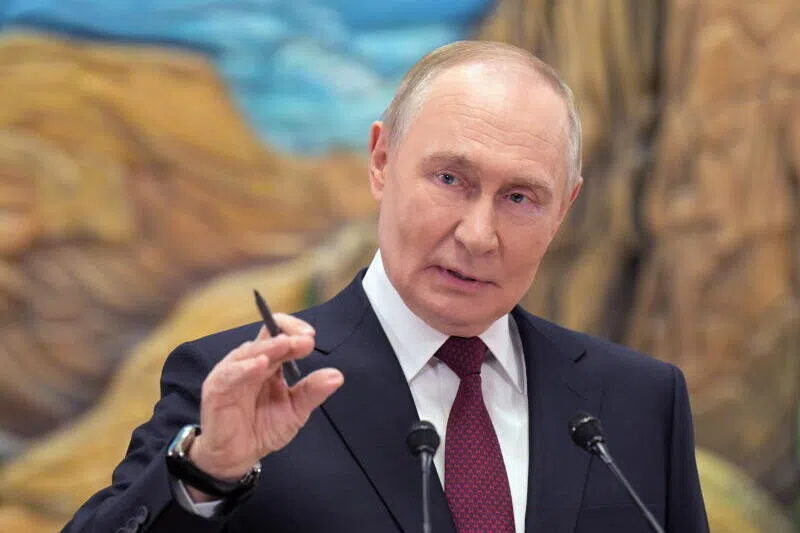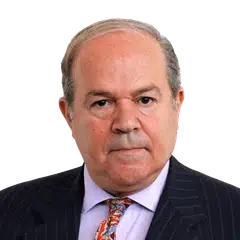News analysis
Will Russia’s economy force a reality check on Putin’s Ukraine invasion?
Sign up now: Get ST's newsletters delivered to your inbox

Russia’s economy is in a bad shape and President Vladimir Putin will soon have to pursue a ceasefire even if he gets no concessions from Ukraine.
PHOTO: REUTERS
Follow topic:
BRUSSELS – Russian President Vladimir Putin has doubled down on his demands that Ukraine must give up large chunks of its territory in return for a ceasefire in the war between the two nations.
Speaking to reporters on Nov 27 during a visit to the Central Asian republic of Kyrgyzstan, Mr Putin said he would halt its military offensive only if Ukrainian forces withdrew from land Russia covets
“If Ukrainian troops leave the territories they occupy, then we will stop fighting,” he said. “If they don’t, we will achieve our aims militarily,” he said, repeating the hardline negotiating position he has maintained throughout this crisis.
However, Ukraine’s European allies are arguing that, after almost four years of intensive fighting, Russia’s economy is in a bad shape and that Mr Putin will soon have to pursue a ceasefire even if he gets no concessions from Ukraine.
And some top Russian officials are now also starting to admit in public that the war is inflicting a high cost on their country’s economy.
Russia remains tight-lipped about the human cost of its invasion. Deaths of Russian soldiers are seldom reported, and the country’s journalists are discouraged from covering military funerals or the plight of bereaved families.
However, a database compiled by Russian dissident media outlet Mediazona, in cooperation with the BBC, indicates that around 150,000 Russian soldiers have been killed since February 2022, when Mr Putin ordered the full-scale invasion of Ukraine. The figure is based on monitoring social media posts as well as publicly available death certificates.
The labour shortages in the Russian economy as a result of such heavy losses and the mobilisation of many young men is worsened by the rapid expansion of industrial production for the military.
The result is rapidly increasing salaries and serious problems for Russian employers. Labour shortages even affect other key Russian government entities, including the all-powerful Interior Ministry.
In late 2022 and as the Ukraine war approached its first year anniversary mark, Interior Minister Vladimir Kolokoltsev revealed that Russia’s police was short of 90,000 officers. Describing the situation as “critical” at that time, he warned that it was having an effect on crime levels across the country.
Almost four years into the war, the Interior Ministry admitted on Nov 26, 2025, that police shortages are even worse: Up to 200,000 police posts now remain vacant, with no fresh applicants in sight.
Such severe labour distortions will last for years, even if the war in Ukraine ended today. Young men accustomed to high salaries and uprooted from Russia’s vast hinterland are unlikely to return to their previous lifestyles or resume previous occupations.
Furthermore, with Russia’s fertility rate now standing at historic lows of around 1.4 per woman, it could take decades for the country to recover from its personnel losses.
Worse still are Russia’s public finances. In a statement released on Nov 24, Russian Deputy Finance Minister Vladimir Kolychev admitted that his government has burned through most of its reserves this year to fund the fighting in Ukraine.
With military expenditure devouring around 40 per cent of all annual spending, the Russian authorities are effectively resorting to printing money and fuelling inflation.
Holes in the budget are now filled by selling state bonds, mainly state-owned Russian banks that are in turn being propped up by Russia’s central bank.
In the first quarter of 2025 alone, the Finance Ministry issued 1.4 trillion roubles (S$23.2 billion) worth of such bonds; during the third quarter of this year, the borrowing stood at 1.55 trillion roubles, according to the Gaidar Institute for Economic Policy.
“Practically, the only way Russia can finance its deficit will be domestic state debt,” the Gaidar Institute, a Moscow-based research outfit named after the country’s foremost post-communist reformer, warned on Nov 24.
Sales of oil and natural gas, which traditionally account for about half of Russia’s export revenues, are also affected.
While US President Donald Trump has largely avoided imposing additional economic sanctions on Russia, he has slapped severe global restrictions
As a result, Russian oil revenues declined in October 2025 by 14 per cent in volume terms, and around 8.6 per cent in prices.
Overall, it is estimated that Russia has lost around 22 per cent of its energy revenues, as both China and India – its chief markets after it lost European customers – are now cutting their purchases of Russian oil and gas.
European governments point to such woes to suggest that Russia cannot continue to pursue its war and that, sooner rather than later, Moscow would have to halt its offensive.
But there is little evidence that this is true. Instead, what seems to be happening is that, after spending years trying to cushion the ordinary Russian population from the effects of the war, Mr Putin’s government is now compelled to impose greater burdens on its population.
Sales taxes are going up in Russia from 20 to 22 per cent
The move is clearly unpopular, especially since Mr Putin promised that no new taxes would be imposed until the end of the decade, when the 73-year-old President may decide to stand for re-election.
However, the government-controlled Russian media has now launched a major patriotic campaign, claiming that the new taxes represent a necessary defence against Western political pressure.
“For the coming 12 or 14 months, Putin has enough money to maintain the current war effort and the current level of expenditures,” says Ms Alexandra Prokopenko, a researcher at the Carnegie Russia Eurasia Centre, a think-tank based in the German capital of Berlin.
And, just importantly for Mr Putin, US President Trump continues to believe that Russia remains fit and ready to continue its war, and that it’s up to Ukraine to make all the concessions if it wishes to stop the fighting.
As long as this view prevails in Washington, Mr Putin is likely to continue his military offensive, regardless of the heavy price Russia pays for this adventure.
Jonathan Eyal is based in London and Brussels and writes on global political and security matters.


